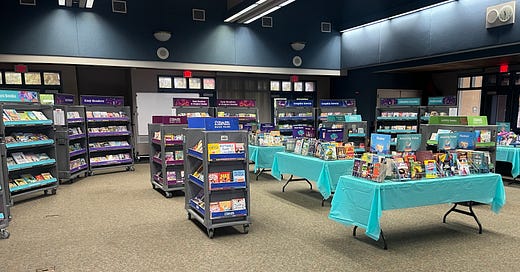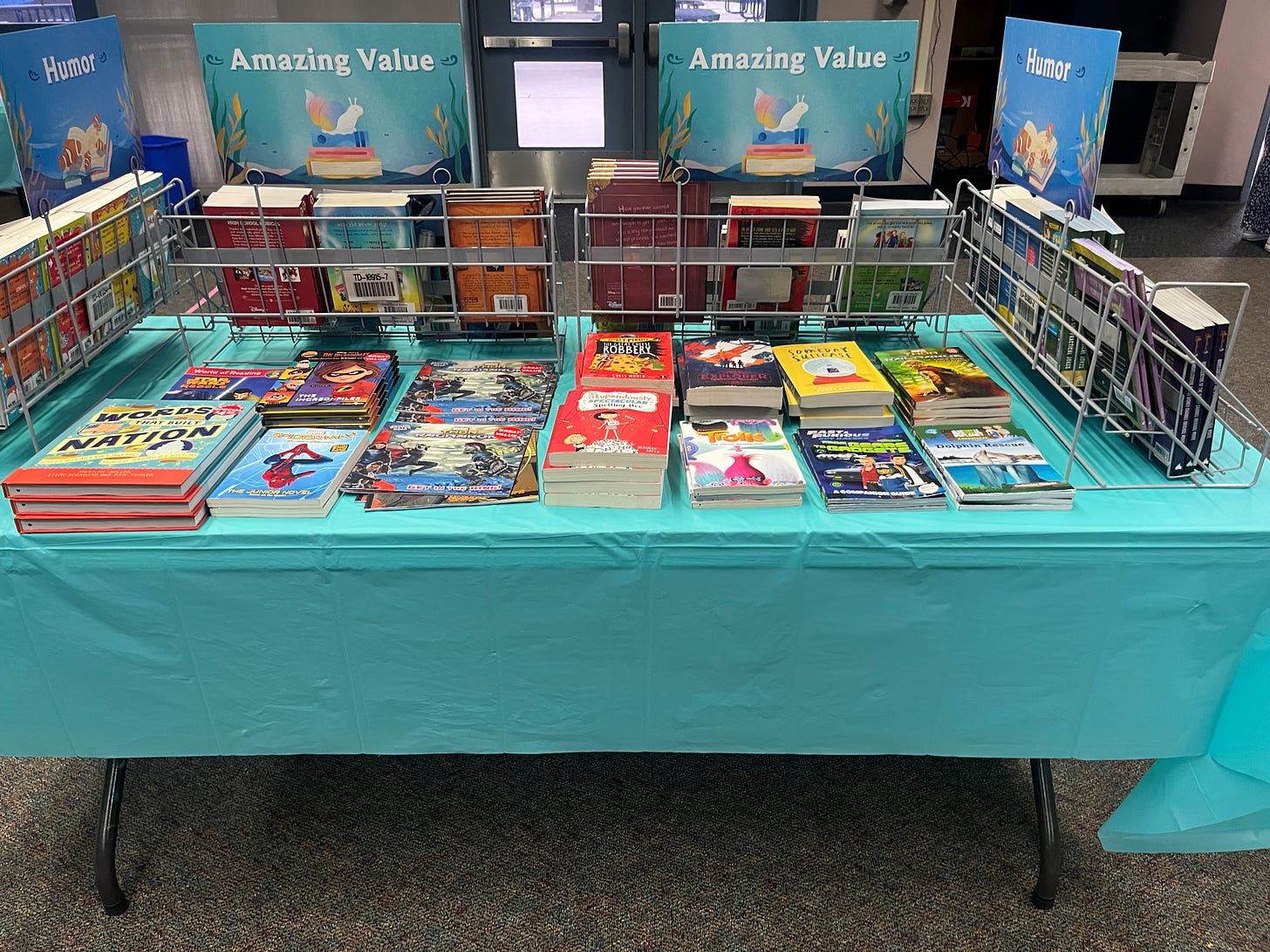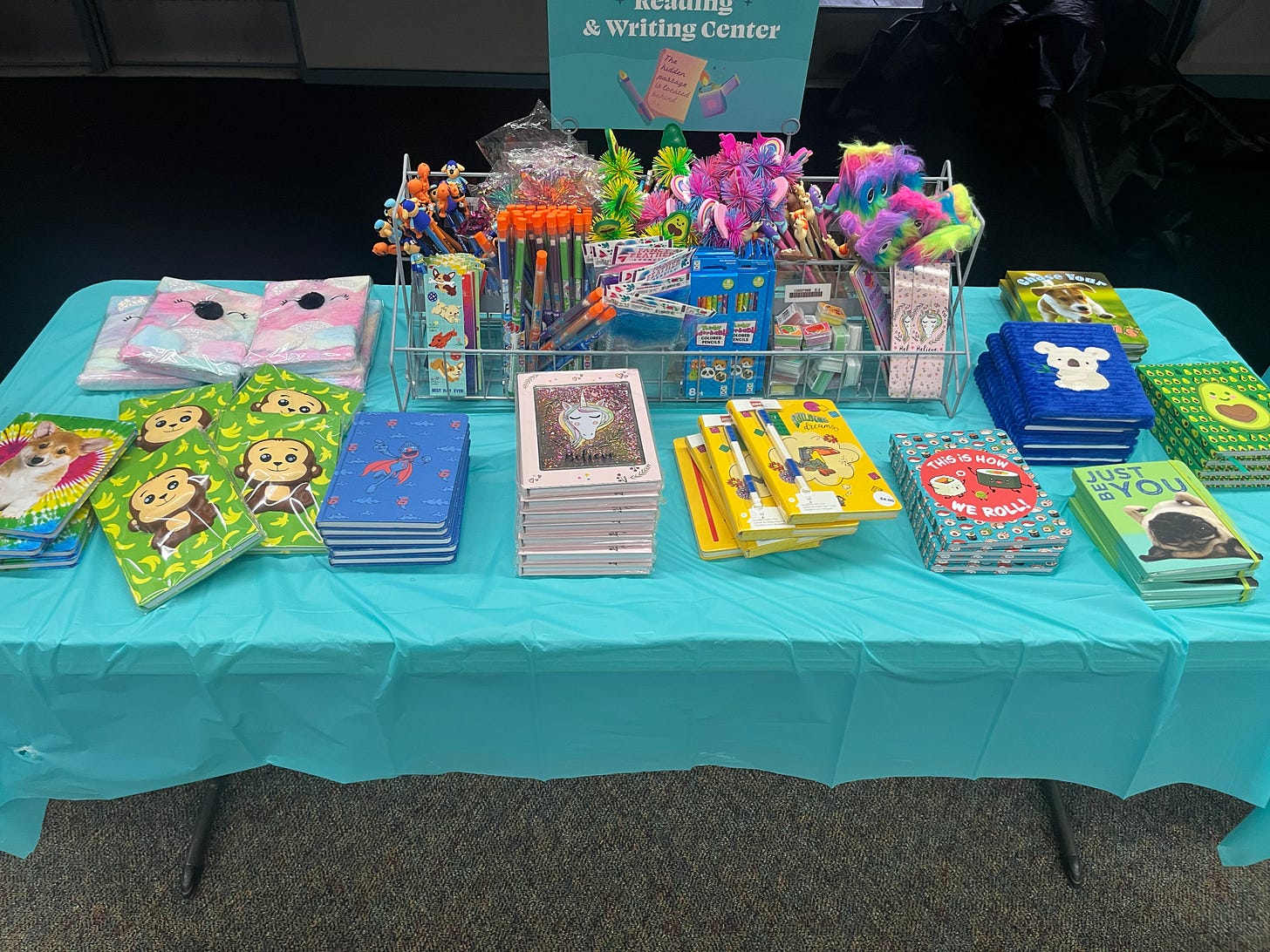Book Fair Comparison: Literati vs. Scholastic
Does nostalgia trump everything or can the new fair on the scene hold its own?
I originally wrote this comparison article right after our book fair wrapped up in September. That was before the news broke about Scholastic’s decision to have an “opt-out/-in” option for “diverse books.” This is a complicated topic, and I particularly appreciate this comment from Pen America (a non-profit organization that “stands at the intersection of literature and human rights to protect free expression in the United States and worldwide”): “What we understand was conceived as a practical adaptation to keep book fairs going in a fraught legal and political climate is clearly at risk of being twisted to accomplish censorious ends.” Scholastic has since pivoted on this decision but the whole situation will no doubt play a role in schools’ choices of book fair vendors. My thoughts below do not touch on this issue, as it wasn’t a factor when I was using these companies’ services.
Hi Readers! This is a niche post. Maybe you’ll read it for curiosity’s sake even if you don’t have any “need” to for book fair planning purposes. But maybe you know the librarian or PTA member who runs book fairs at your kids’ or family member’s school. If so, I’d be honored if you considered passing it on.
Recently our school hosted a book fair that I coordinated along with a PTA representative. Last year, we used Scholastic; this year we tried out a Literati fair. We had a great experience with Literati, and I have a lot of thoughts about the pros and cons to each company’s fairs and I thought I would share them for anyone looking for honest thoughts and feedback.
First, a couple of intangible pros to each company for me personally. These are not quantifiable comparisons, nor are they really all that Important or Official as far as book fair values. But regardless, these are things that come up in conversation regularly as I talk to other book fair coordinators/volunteers/shoppers. These are things I can’t help but like about each company.
Scholastic: Nostalgia/Name Recognition
Most Americans who grew up in the 80s and 90s like me, remember the Scholastic book fair (and book orders) from their childhood. The nostalgia is real, and the memes reflect it, which you can see in the post I wrote last year after our fair (which was mainly about the nostalgia and my own highlights from that fair). Scholastic has actually been hosting book fairs since approximately the year I was born, so let’s just say, over 40 years. ;) So they are an experienced, well-oiled machine. But does that mean they are still the best? I think that’s now up for debate.
Literati: Aesthetics/Theme
Literati is relatively new to the book fair market, but they came on the scene with flair. Whoever does the design work for Literati speaks my language of aesthetics. I love the design of all their materials, and their book fair themes each season are gorgeous and clever. This season’s theme is a mystery theme, Crack the Case! and I believe the last one was an under the sea theme. The theme applies to all the digital & printed promotional materials, and there are even interactive games on the website, and special book selections that reflect the theme.
Nostalgia and aesthetics aside, the main issues to consider with book fairs are the rewards and the book selection. Here I will give my candid thoughts on both companies and also a few final thoughts on some other features.
Rewards
At the level of sales of our fair, we would have received 50% of our sales in Scholastic Dollars rewards, whereas with Literati we only received 30% rewards (and 50% of “book profit” rewards, which means I was able to buy some books right at the fair, using our profits and paying only half price, but I was limited to books at the fair, a lot of which were paperbacks which aren’t great for the library).
While the reward percentage is 20% less, to me this is still a decent trade-off, because Scholastic Dollars may only be spent in the Scholastic Dollars catalog store which has a much smaller selection than TitleWave, which is the vendor where I can spend my Literati reward dollars. TitleWave has almost anything I search for, including books in other languages (besides Spanish, which Scholastic does have a small selection of).
The cash reward option is the same for both companies: 25% of sales. Last year with Scholastic I took about 1/5 in cash and spent it at TitleWave. The rest I took in Scholastic Dollars. The SD Catalog does have some library supplies, which TitleWave doesn’t have (like some furniture).
If I were to do a Scholastic fair in the future, I would take the majority of the rewards in cash so that I could spend the rewards at vendors like TitleWave with more book selection available, which then makes for only a 5% difference between taking cash from Scholastic, and taking TitleWave credit from Literati.
Both companies offer a bonus in rewards if you host a second fair in one school year. Considering the amount of work and logistics a fair takes, we probably won’t do this, though I may try to do an online-only fair in the spring, if my principal is up for that.
Book Selection & Focus on Reading
Scholastic prides itself on having the books kids want. Popular series like the Babysitters Club, Dog Man, Diary of a Wimpy Kid, and Mo Willems’ Piggie & Elephant and Pigeon books can be found in Scholastic fair stock and in the SD catalog.
Out of those mentioned, Literati only has Wimpy Kid books, and only a few titles. Both companies have offered pre-orders for the new Wimpy Kid book (Scholastic also did this with Dav Pilkey’s new Cat Kid book last year). While Literati doesn’t carry all these series, they do offer some resources to guide kids who like them with recommendation guides (i.e. if you like Babysitters Club, you make like these books). I printed these guides and found them useful at the fair when kids asked me about those series we didn’t have.
Overall, this isn’t a huge issue in my opinion, because guess what! Kids already have read and maybe own a lot of those books (and the library has most of them too). The book fair is a great place to discover new books/series. And despite these “missing” favorites, in my mind, Literati is hands-down the winner when it comes to both book selection and focus on reading. Our biggest complaint from parents last year was that Scholastic had too many tchotchkes and kids were spending too much money on toys & junk and not enough on books.
Literati’s main focus is on clearly on books. They do have a good selection of journals, pencils, pens, & erasers (the smelly putty erasers were the hit of the fair!), but the amount of affordable books in the correct age categories for our students was impressive. Scholastic gave us a surprising amount of board books and books that include toys (which parents don’t tend to love), adult books, and books priced $12.99 and up. Literati, on the other hand, had a large variety of picture books and easy readers but nothing geared toward babies. The YA/adult books were few, and they were all books that high-level upper elementary readers might also be interested in. There were very few expensive hardbacks, and instead the fair was full of affordable paperbacks, including a good amount of value books under $5. Literati also offered lots of activity and joke books, which were a huge hit this year.
With Literati, our students and families spent 73% of their money on books. Scholastic did not give us a category breakdown on our final sales reports (and when I emailed customer service they said they are unable to provide it), but I have a hunch that the book percentage would be lower based on my own observations at the fair. Related, Literati uses Square register systems which are very easy to use, and that could be partly why the category report is available so readily.
A few more notes and comparisons
Setup is easy for both companies, but again Literati wins here because they offer metal book stands that help keep the tabletop books organized. You simply lift them out of boxes and place them on tables. Only 1 box of books had to be unpacked book by book. With Scholastic we had a lot of loose books on tables that got messed up and had to be regularly reorganized.
Both companies have great resources and guides for volunteers and book chairs. Again, Literati has the corner on this though with a more user-friendly website. The financial wrap-up was easier with Literati (probably because of the Square system). Scholastic gave us three registers which was very helpful at busy times, though I heard from a colleague at a different school that Literati may also have Square phone adapters available at request (these would only help at busy parent times since they would be for credit cards I imagine), or a third register for schools with a history of large sales.
Scholastic offers a donation program, with a round-up option, which is awesome, though I didn’t find it easy to use last year (that could be that I was just too overwhelmed to figure it out as a first-time book fair coordinator). Literati offers staff and volunteer discounts of 20% off! This cuts into profits of course, but I think it’s a great incentive for volunteers and also a nice gift for teachers & staff.
I can’t get into specific details about the gift cards/eWallet programs as it’s a little too complicated, but basically, both companies offer ways for students to have “digital money” to spend at the fair by simply scanning a barcode (it’s easy to print these out to have at the register). Scholastic’s system is nicer because after the fair you can use the remaining eWallet funds as gift cards to shop online on their site, whereas Literati’s can only be spent at the next fair. Teachers can also set up an eWallet that families can donate to. I don’t have much experience with this or really with teacher wish lists because we didn’t have a lot of time/manpower to set those up or help teachers use them.
Both companies offer a concurrent online fair. This year with Literati our online fair started a month before and ended the night of our last day. The long timeline of online shopping allows plenty of time for parents to do research on books to see which ones they think would be best for their children. Scholastic is a little different as the online version starts on the first day of the fair and goes for 2 weeks. The rewards vary a bit with their online fair, too. Both companies also offer replenishments/restock to order more of things sold out at the fair. This is an area where Literati could improve, both in the amounts they allow you to reorder and what’s available (but it’s less of an issue because of Paid Orders, see below!).
Two more bonus features for Literati are Paid Orders and the Book Subscription box. I hate to see kids get stressed because we sold out of books they wanted or that their friends got. Obviously they could buy the book elsewhere, but to a kid that’s shopping at the book fair, that’s not the same thing. Any book that we ran out of (or that was on the online fair) could be ordered and paid for at the register. Books will be shipped to the school fair about 10 days after the fair. So it’s a delayed gratification, but the kids will still get that book at school. ;) We had quite a few kids do this, and it was a great option. It’s possible Scholastic has something like this but if so I never heard about it last year.
Literati as a company started out as a book subscription company and they still offer these and make it an ongoing fundraiser for the school. We receive 10% (in the form of a check sent every few months) from any book subscription boxes. The boxes seem really cool and would make a great gift. We won’t make much money from this, but maybe enough to buy 1-2 books a year for the library.
So that’s it! I think for now, I’m sold on Literati. I think it’s the company that makes our parents the most happy because it gets kids excited about reading and less distracted by toys. It also wins out on more aspects related to planning and hosting a book fair. I still have a place in my heart for Scholastic, but I think they now have some solid competition and could learn a few things from Literati to improve and modernize their fairs.
If you have any questions about my experiences, feel free to leave a comment! Or you could share your own book fair experiences or memories in the comments, too.








Thank you for this! My son will attend a very small high school and we would like to offer a fun book fair the older kiddos, do you have any suggestions? There is a lot of interest along the students, 🙏
My kids are having a Literati fair at school this week and were complaining that the Scholastic books were not available. A little searching turned up your wonderful breakdown and I hope they appreciate what Literati has to offer a bit more. Thank you for the more comprehensive look at the two fairs.